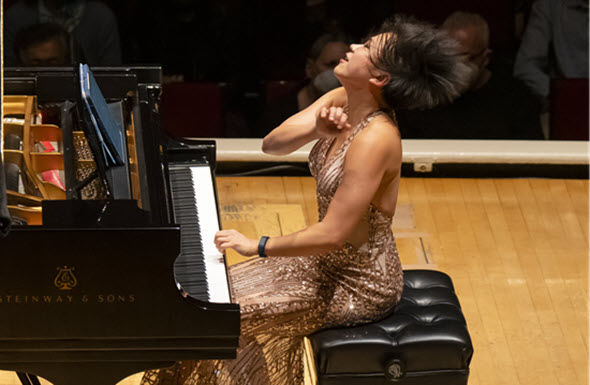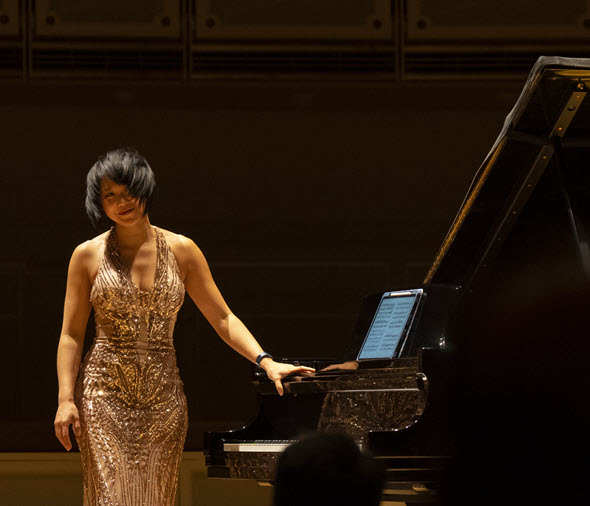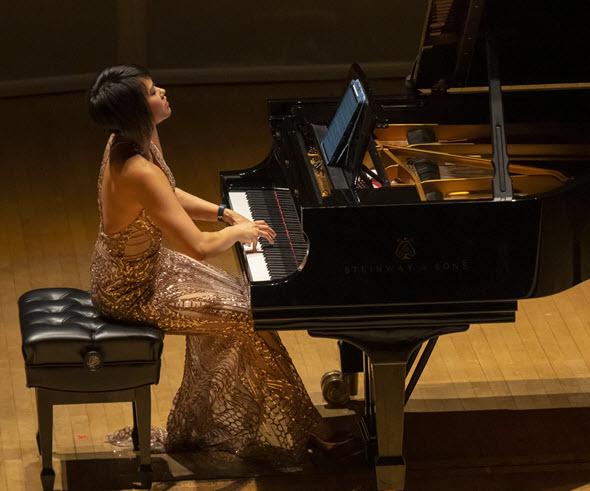Pianist Yuja Wang delivers an electric recital, then makes it a party with blizzard of encores
Review: Yuja Wang, piano. April 10 at Orchestra Hall.
By Lawrence B. Johnson
Yuja Wang is a pianistic tiger, a technical wizard and, not least, an indefatigable and audience-savvy performer who can leave 2,000 listeners in a collective meltdown. But if that were the sum of one’s account of her recital April 10 at Orchestra Hall, it would be lacking by half. This remarkable and indeed complete pianist also possesses an unfailing poetic sensibility, a precisely gauged and unerring touch at any speed and a sure grasp of structure. Her formidable program, capped by eight encores, was an immersive delight.
It didn’t begin quite that way, however. Not for me. Wang started with Beethoven’s Sonata in E-flat, Op. 31, No. 3, among the most familiar and immediately engaging of the 32 sonatas. As if set on making a statement, Wang hammered out the opening movement in a mannered stentorian fashion that might indulgently be characterized as post-Baroque. It was bizarre, doubly so in that the remainder of her reading seemed to bear no relation to that iconoclastic outburst. The ensuing Scherzo sparkled, the minuet fairly sang and the finale sailed along with Wang’s characteristic ease and freedom.
As for post-Baroque, the pianist then turned to Schoenberg and his virtuosic, even exhilarating Suite for Piano, Op. 25, six dance movements in the spirit of Bach reimagined (to invoke a contemporary term) as 12-tone arabesques. They were scintillating, a heady reminder of a once-dominant composer whose music rarely shows up any more. Wang made these improbable fusions of the old dances and the almost as antiquated serialism quite personal and fetching. Who knew?
Two Ligeti Etudes rounded out the first half: “Autumn in Warsaw” and “The Devil’s Staircase,” the former inescapably evocative of Debussy’s impressionism and the latter more of an overt technical display within a framework of piquant harmonies. Wang’s far-ranging program then proceeded to the proto-modernism of Scriabin’s grand Sonata No. 3 in F-sharp minor, which she began with a dark, insistent turn through an opening movement marked Drammatico. Indeed, it was. Perhaps Wang saw some symmetry between this first flourish of Scriabin and her starkly wrought opening movement of the Beethoven. In any case, the effect in Scriabin was gripping, even daunting. The pianist’s deep dive into the F-sharp minor Sonata’s intricate middle movements drew the listener ineluctably with her before a fiery Presto finale brought the whole thing to a shimmering finish.
Wang then caromed off to Madrid with Albéniz’s brilliant and multi-hued “Lavapiés” from Book 3 of his piano collection “Iberia.” The title refers to a section of Madrid that once was the Jewish quarter but in modern times has become a multicultural quiltwork, as Albéniz’s effusive essay aims to depict. It is a deceptively virtuosic piece, as technically exacting as it is colorful, and Wang tossed it off with splashing assurance.
Her printed program closed with two selections by the Ukrainian composer Nikolai Kapustin, who died in 2020 at age 82. Though classically trained, Kapustin was a serious jazz pianist who led his own group. And as a “formal” composer, he liked to weave jazz elements into his work; hence his 24 Preludes in Jazz Style, Op. 53. Wang played two of them, the distinctly bluesy No. 11 in B major and the swinging No. 10 in C-sharp minor. A nice cap to a highly rewarding program.
Then Wang started playing encores, and the fireworks began in earnest. This was the killer pianist unfettered, indomitable, unstoppable. But who was asking her to stop? it all glittered, and it was all gold: Philip Glass’ Etude No. 6, Bach’s Badinerie from Orchestral Suite No. 2, Márquez’ Danzon No. 2, Moszkowski’s “La jongleuse,” Prokofiev’s Precipitato from Piano Sonata No. 7, Mendelssohn’s “Songs Without Words,” Op. 67, No. 2, and Tchaikovsky’s Dance of the Four Swans. The eighth encore topped everything else: Horowitz’s madcap “Carmen” Variations, crazy-difficult and polished off at lightning speed. Not sure Wang noticed the difficulty. But every jaw in the house must have gone slack at the speed.




